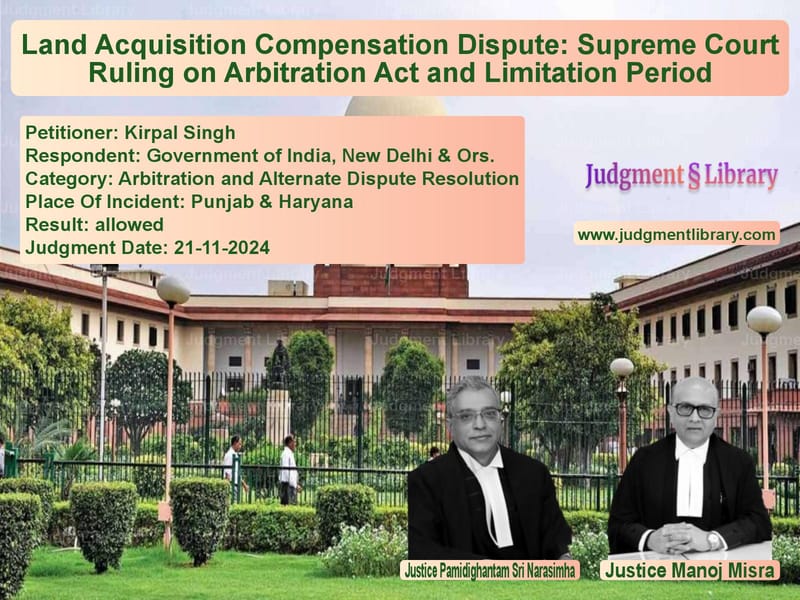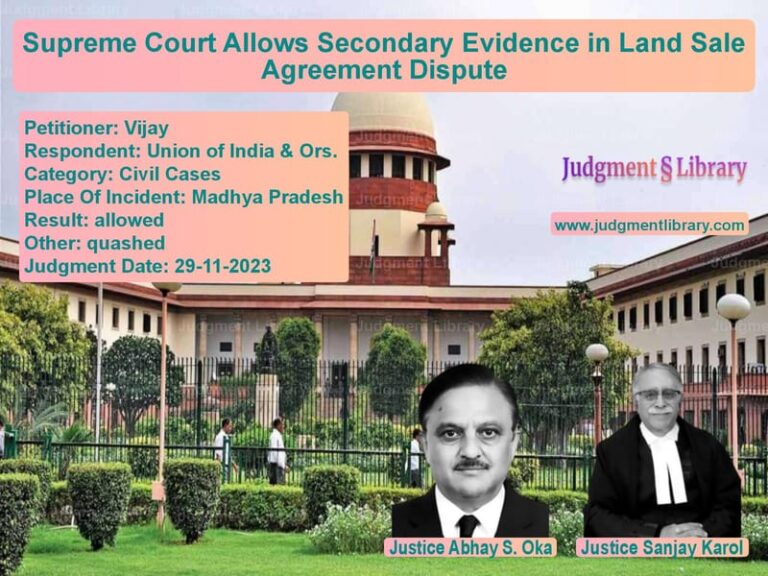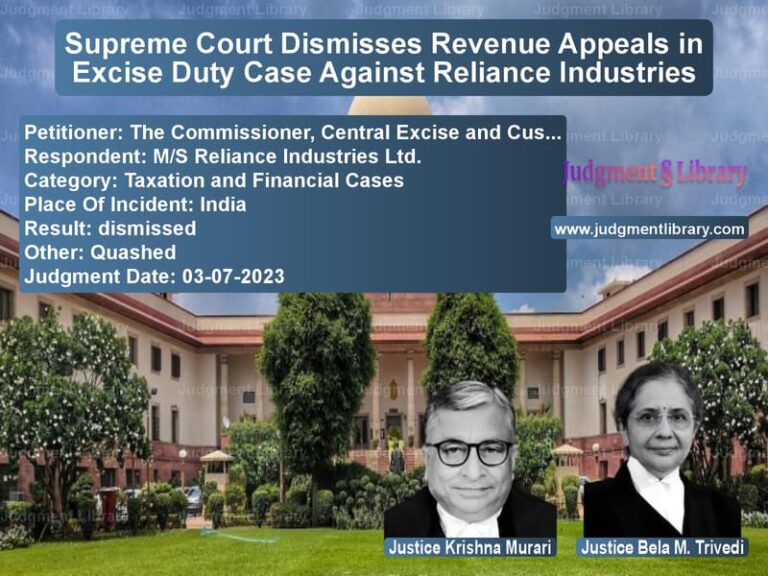Land Acquisition Compensation Dispute: Supreme Court Ruling on Arbitration Act and Limitation Period
The Supreme Court of India recently addressed an important legal question regarding the applicability of Section 14 of the Limitation Act in arbitration proceedings related to land acquisition under the National Highways Act. The case, Kirpal Singh vs. Government of India & Ors., revolved around whether the period from October 20, 2011, to February 23, 2012, should be excluded while calculating the limitation period for filing objections under the Arbitration and Conciliation Act, 1996.
Case Background
The dispute arose when the appellant, Kirpal Singh, challenged the compensation awarded for land acquired under the National Highways Act (NH Act). The award was passed on July 25, 2011, and a certified copy was received on September 8, 2011. However, instead of following the prescribed legal route, Singh filed a Regular First Appeal before the High Court on October 20, 2011, which was later found to be erroneous.
The High Court registry raised objections to this appeal on November 9, 2011, but Singh’s legal counsel only received this communication on January 20, 2012. Upon realizing the mistake, Singh withdrew the appeal and filed a petition under Section 34 of the Arbitration Act on February 23, 2012, challenging the compensation amount. However, the District Judge dismissed this petition on May 16, 2012, stating that it was time-barred.
Legal Arguments
Arguments by the Appellant
Kirpal Singh, represented by Senior Advocate Gaurav Agarwal, argued that the period between October 20, 2011, and February 23, 2012, should be excluded under Section 14 of the Limitation Act. He relied on the Supreme Court’s ruling in Consolidated Engineering Enterprises vs. Principal Secretary, Irrigation Department, which held that Section 14 applies to arbitration proceedings where there is no express exclusion.
In this case, the Supreme Court had stated:
“Having regard to the legislative intent, it will have to be held that the provisions of Section 14 of the Limitation Act, 1963, would be applicable to an application submitted under Section 34 of the Act of 1996 for setting aside an arbitral award.”
Arguments by the Respondents
The respondents, represented by Advocate Rajat Sangwan on behalf of the National Highway Authority of India (NHAI), contended that arbitration timelines must be strictly interpreted. They argued that even if Section 14 applied, the exclusion should not extend beyond October 20, 2011, meaning Singh’s Section 34 petition would still be time-barred.
They also emphasized that Section 3(G)(7) of the NH Act reinforces strict timelines for compensation-related challenges, limiting the scope for condonation of delays.
Supreme Court’s Judgment
The Supreme Court, in a bench comprising Pamidighantam Sri Narasimha and Manoj Misra, ruled in favor of Kirpal Singh. The Court held that the appellant’s delay was justified as he had initially pursued an incorrect legal remedy in good faith. Consequently, the period from October 20, 2011, to February 23, 2012, was excluded from the limitation period calculation under Section 14 of the Limitation Act.
Read also: https://judgmentlibrary.com/supreme-court-rules-on-arbitration-clause-in-public-premises-dispute/
The Court reasoned:
“When the substantive remedies under Sections 34 and/or 37 of the Arbitration Act are by their very nature limited in their scope due to statutory prescription, it is necessary to interpret the limitation provisions liberally, or else, even that limited window to challenge an arbitral award will be lost.”
Final Ruling
- The appeals were allowed, and the High Court’s order dated October 19, 2019, was set aside.
- The District Judge’s order dismissing the Section 34 petition as time-barred was also overturned.
- The Supreme Court restored the Section 34 petition in Arbitration No.3435/2012 and directed the District Judge, Jalandhar, to hear the matter on its merits.
Implications of the Judgment
This ruling has significant implications for arbitration cases, particularly those involving land acquisition under the NH Act:
- It clarifies that Section 14 of the Limitation Act applies to arbitration proceedings, allowing exclusion of time spent in pursuing mistaken legal remedies.
- It underscores the importance of a liberal interpretation of limitation provisions to prevent injustice.
- It sets a precedent for landowners challenging compensation awards, ensuring they are not penalized for procedural missteps.
The decision is a major victory for individuals seeking fair compensation under the NH Act and reinforces the judiciary’s role in ensuring equitable access to legal remedies.
Petitioner Name: Kirpal Singh.Respondent Name: Government of India, New Delhi & Ors..Judgment By: Justice Pamidighantam Sri Narasimha, Justice Manoj Misra.Place Of Incident: Punjab & Haryana.Judgment Date: 21-11-2024.
Don’t miss out on the full details! Download the complete judgment in PDF format below and gain valuable insights instantly!
Download Judgment: kirpal-singh-vs-government-of-india,-supreme-court-of-india-judgment-dated-21-11-2024.pdf
Directly Download Judgment: Directly download this Judgment
See all petitions in Arbitration Awards
See all petitions in Dispute Resolution Mechanisms
See all petitions in Arbitration Act
See all petitions in Settlement Agreements
See all petitions in Enforcement of Awards
See all petitions in Judgment by P.S. Narasimha
See all petitions in Judgment by Manoj Misra
See all petitions in allowed
See all petitions in supreme court of India judgments November 2024
See all petitions in 2024 judgments
See all posts in Arbitration and Alternate Dispute Resolution Category
See all allowed petitions in Arbitration and Alternate Dispute Resolution Category
See all Dismissed petitions in Arbitration and Alternate Dispute Resolution Category
See all partially allowed petitions in Arbitration and Alternate Dispute Resolution Category







